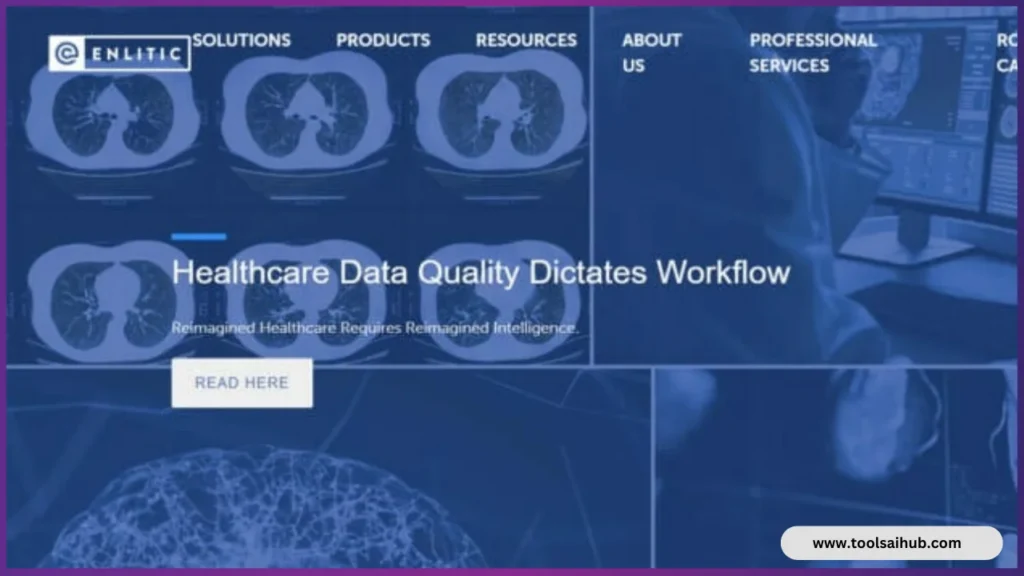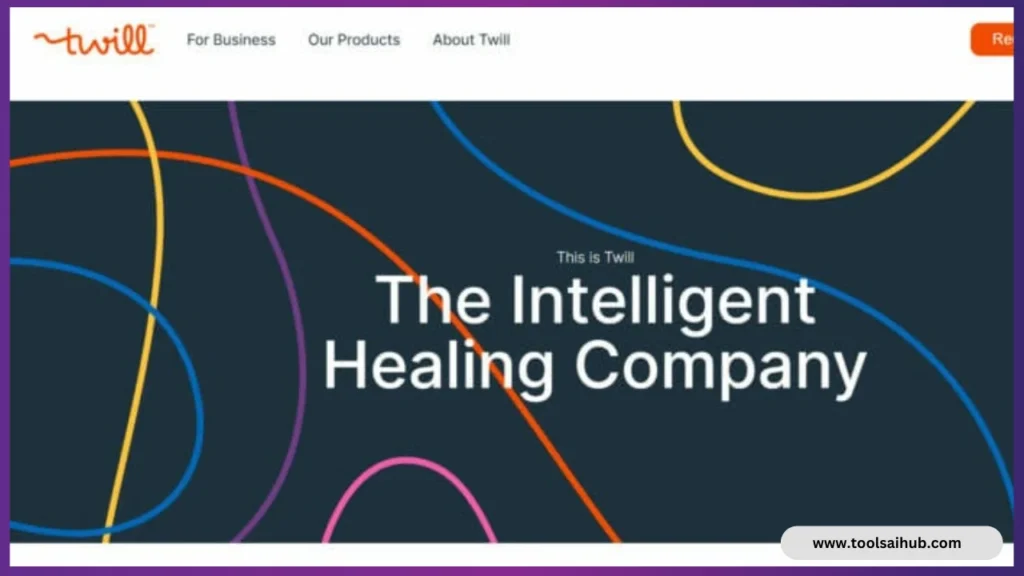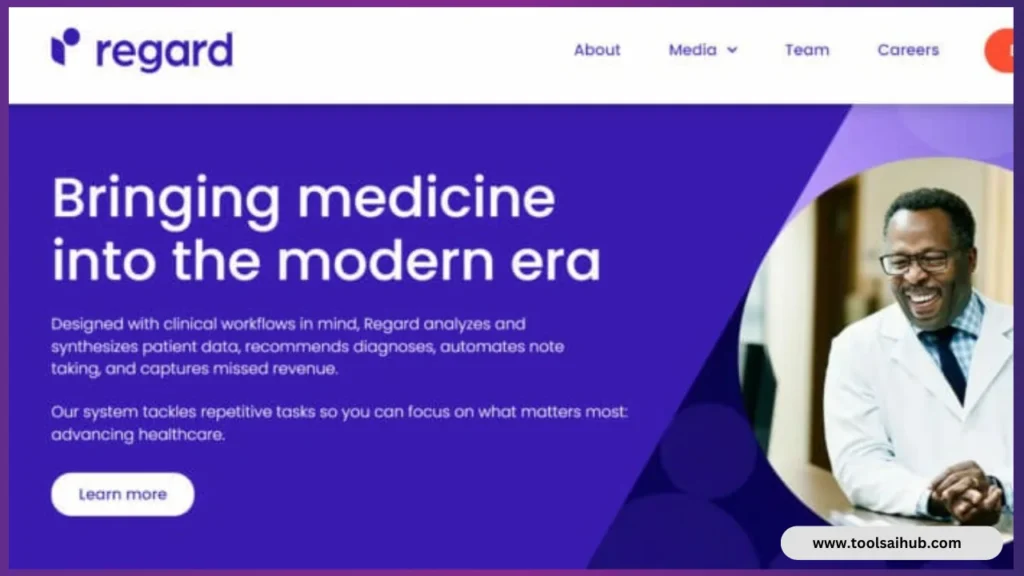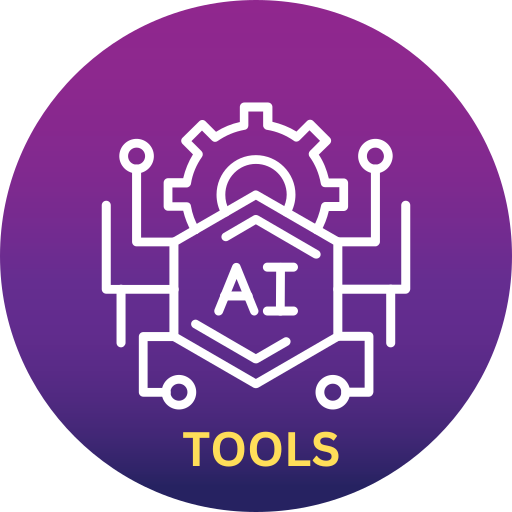In 2025, AI is transforming the healthcare industry by introducing advanced tools that enhance patient care, optimize workflows, and improve overall medical outcomes.
This blog highlights the top 5 AI healthcare tools, showcasing their practical applications, real-world examples, and the advantages they offer to both patients and healthcare professionals. From diagnostics to personalized treatments, these innovative tools are paving the way for the future of healthcare.
AI In Healthcare
AI in healthcare involves the application of artificial intelligence technologies to support various aspects of medical care, including diagnostics, treatment planning, administrative tasks, and patient management.
AI systems utilize machine learning, natural language processing, and data analytics to examine complex medical data, uncover patterns, and offer insights that can enhance patient outcomes.
In healthcare, AI enhances tasks like disease detection, medical imaging analysis, drug discovery, and personalized treatment plans. It enables healthcare providers to make quicker decisions,
AI helps improve decision accuracy, streamline workflows, and minimize human errors, ultimately boosting efficiency and enhancing patient care.
1. Merative (Formerly IBM Waston Health)

Merative (Formerly IBM Watson Health) Merative, formerly IBM Watson Health, is a healthcare company focused on data, analytics, and technology, offering solutions designed to enhance health outcomes and optimize healthcare delivery.
Merative employs advanced AI, data analytics, and cloud-based technology to assist healthcare organizations, life sciences companies, and government agencies in making informed decisions, optimizing operations, and enhancing patient care.
Key Capabilities
1. AI-Powered Solutions: Merative utilizes artificial intelligence to support healthcare diagnostics, treatment planning, and predictive analytics.
2. Data-Driven Insights: Analyzes vast amounts of health data to provide actionable insights, helping healthcare providers improve care delivery and patient outcomes.
3. Innovation in Life Sciences: Enhances drug discovery and development through advanced analytics, accelerating research in pharmaceuticals and biotechnology.
4. Clinical Decision Support: Provides tools that help clinicians make more accurate, evidence-based decisions for better patient outcomes.
5. Cloud-Based Healthcare Solutions: Leverages cloud technology to integrate and manage healthcare data, promoting collaboration across the healthcare ecosystem.
Pros:
Cutting-Edge AI Solutions: Utilizes advanced AI for diagnostics and treatment planning.
Robust Data Analytics: Delivers actionable insights that enhance healthcare outcomes.
Life Sciences Innovation: Speeds up drug discovery and research development.
Cloud-Based Integration: Simplifies data management and promotes collaboration.
Cons:
Complex Integration: Requires considerable time and resources to implement effectively.
High Cost: Advanced features can be expensive, particularly for smaller organizations.
2. Enlitic

Enlitic is a healthcare technology company that utilizes AI to specialize in medical imaging analysis. Established in 2014, the company focuses on creating deep-learning models aimed at improving diagnostic accuracy and speed, particularly in radiology. Its innovative solutions help radiologists analyze medical images, such as X-rays and CT scans, with greater precision.
Enclitic’s AI-powered solutions assist radiologists and healthcare providers in interpreting complex medical images like CT scans, X-rays, and MRIs. By leveraging advanced deep learning models, these tools help detect diseases at earlier stages, ultimately improving diagnostic precision and enhancing patient outcomes.
Key Capabilities
1. Deep Learning Techniques: Enlitic employs sophisticated deep learning methods to analyze medical images, enhancing diagnostic precision.
2. Automated Detection: The platform streamlines the identification of abnormalities in radiological images, enabling radiologists to detect potential issues more effectively.
3. Seamless Integration: Enlitic integrates smoothly into existing radiology workflows and systems, ensuring minimal disruption to current practices.
4. Instant Feedback: The technology delivers real-time evaluations of images, speeding up decision-making for healthcare providers.
5. Support for Multiple Modalities: Enlitic is compatible with various imaging types, including X-rays, CT scans, and MRIs, providing versatility across different medical environments.
Pros
Improved Diagnostic Precision: Leverages advanced deep learning algorithms to enhance diagnostic accuracy, minimizing the chances of overlooking abnormalities.
Enhanced Workflow Efficiency: Automates the analysis of images, enabling radiologists to concentrate on more complex cases and streamline overall operations.
Smooth Integration: Integrates easily with existing radiology systems, reducing disruptions and facilitating quick implementation.
Immediate Feedback: Offers real-time evaluations of images, promoting faster decision-making in clinical environments.
Broad Applicability: Supports various imaging modalities, making it suitable for different medical specialties and settings.
Cons
Reliance on Data Quality: The performance of the algorithms is highly dependent on the quality and amount of training data, which can be inconsistent.
Risk of over-reliance: There’s a concern that healthcare professionals might rely too heavily on AI tools, potentially undermining their own expertise.
Integration Hurdles: Although designed for seamless integration, there can still be compatibility issues with certain legacy systems.
3. Twill

Twill is a user-friendly digital logistics platform that streamlines and simplifies the shipping process for businesses. Offering comprehensive, end-to-end solutions, it handles everything from booking and tracking shipments to managing documentation, all through an easy-to-navigate online interface.
As part of the Maersk family, Twill seamlessly integrates with the company’s vast global supply chain network, allowing users to efficiently manage international shipping with minimal effort.
Basically, The Twill is transforming the logistics industry by providing businesses with an intuitive digital platform that simplifies the challenges of global shipping. Designed with small and medium-sized enterprises (SMEs) in mind, it enables companies to manage every aspect of their supply chain— from booking to tracking shipments— all within a single, streamlined platform.
The Twill also empowers businesses to expand globally while keeping full control over their logistics operations.
Key Capabilities
1. End-to-end Shipping Management: Streamlines booking, tracking, and documentation within a single platform.
2. Real-Time Tracking: Offers live updates to keep users informed on shipment progress.
3. Transparent Pricing: Provides clear, upfront pricing for shipping services, avoiding hidden fees.
4. Global Reach: Leverages Maersk’s extensive global supply chain network for seamless international shipping.
5. User-Friendly Interface: Designed for ease of use, making logistics management simple for all users.
Pros
Ease of Use: With its intuitive interface, Twill makes logistics management straightforward, even for users without extensive experience.
End-to-End Management: The platform covers the entire shipping process, from booking to delivery, all in one place.
Real-Time Tracking: Twill offers live updates, giving businesses complete visibility over their shipments at all times.
Cons
Limited to Maersk’s Network: While Twill integrates seamlessly with Maersk, it may not offer as much flexibility for businesses using other carriers.
SME Focus: Tailored mainly for small and medium-sized businesses, larger enterprises may find it lacking in advanced features needed for more complex operations.
4. Regard

Regard is a cutting-edge telehealth platform dedicated to providing accessible and efficient mental health care. By facilitating secure video sessions between patients and licensed therapists, Regard removes traditional obstacles to obtaining mental health support, making it easier for individuals to seek the help they need.
The platform As Well provides a variety of services, such as therapy, assessments, also wellness resources, all aimed at enhancing mental well-being. Its user-friendly interface allows patients to easily schedule appointments and receive care from the comfort of their own homes.
By harnessing technology, Basically Regard is not only improves the convenience of accessing mental health support but As well seeks to destigmatize mental health care, making it an essential resource for those in need.
Key Capabilities
1. Teletherapy: Links patients with licensed therapists through secure video sessions.
2. Comprehensive Services: Provides therapy, assessments, and wellness resources for holistic support.
3. Intuitive Interface: Facilitates easy scheduling and access to care from any device.
4. Flexible Appointment Options: Offers both one-time sessions and ongoing therapy arrangements.
5. Privacy Assurance: Guarantees confidentiality and security for all patient interactions.
Pros
Convenient Access: Patients can obtain care from the comfort of their homes, saving time on travel.
Comprehensive Services: Provides a wide array of mental health resources to meet diverse needs.
Flexible Scheduling: Allows for easy appointment booking that accommodates individual schedules.
Cons
Limited Face-to-Face Interaction: May not offer the same personal connection as traditional in-person therapy.
Internet Dependence: Requires a stable internet connection for optimal use.
5. DeepScribe

DeepScribe is a cutting-edge AI-powered platform aimed at simplifying medical documentation for healthcare providers. By automatically transcribing and summarizing interactions between patients and clinicians, DeepScribe enables healthcare professionals to concentrate more on delivering care instead of getting bogged down by paperwork.
The platform effortlessly integrates with current electronic health record (EHR) systems, guaranteeing that all notes and pertinent information are accurately captured in real-time. With its sophisticated speech recognition and natural language processing features, DeepScribe boosts efficiency and helps alleviate burnout among healthcare professionals.
This is not only enhances workflow but also leads to improved patient outcomes by enabling providers to spend more time on meaningful interactions with their patients.
Key Capabilities
Automated Transcription: Transforms patient-provider conversations into precise written notes in real time.
Seamless EHR Integration: Easily integrates with existing electronic health record systems, streamlining documentation.
Natural Language Processing: Utilizes advanced algorithms to accurately interpret and summarize conversations.
Speech Recognition: Leverages cutting-edge technology to capture spoken language with exceptional accuracy.
Reduced Burnout: Reduces administrative workload, enabling healthcare providers to focus more on patient care.
Pros:
Time-Saving: Automates medical documentation, giving healthcare providers more time for patient care.
Accurate Transcription: Delivers highly accurate transcriptions using advanced speech recognition technology.
EHR Integration: Effortlessly integrates with existing electronic health record systems for smoother workflows.
Cons:
Initial Setup: Requires time and effort to incorporate into existing workflows.
Speech Recognition Challenges: May face difficulties with accents or background noise.
The Potential of AI in Healthcare
The potential of AI in healthcare is immense, providing transformative solutions that elevate patient care, boost efficiency, and cut costs. AI-driven tools can diagnose diseases with greater accuracy and speed compared to traditional methods, enabling doctors to make more informed decisions. From predictive analytics that forecast patient outcomes to personalized treatment plans tailored to each individual, AI is revolutionizing the future of healthcare.
As AI technology continues to evolve, its impact on healthcare will expand, opening doors to more innovative, accessible, and efficient healthcare solutions.
Robotics in Surgery:
Essentially robotic surgery is revolutionizing the medical field by enhancing precision, reducing recovery times, and minimizing risks. Robotic-assisted surgeries allow surgeons to perform complex procedures with greater accuracy through minimally invasive techniques.
These systems provide enhanced control, smaller incisions, and reduced post-operative pain for patients, resulting in quicker recovery times.
Medical Records Management:
Medical Records Management is critical for ensuring accurate, organized, and secure handling of patient data. With the shift to digital systems, Electronic Health Records (EHRs) have made it easier for healthcare providers to access and update patient information in real-time, improving the quality of care.
Effective medical records management minimizes administrative errors, fosters better collaboration among healthcare teams, and ensures adherence to legal and regulatory requirements.
As healthcare evolves, efficient medical records management becomes essential for enhancing patient outcomes and boosting operational efficiency.
AI Penetrating the Healthcare Industry:
AI is making significant inroads into the healthcare industry, transforming how care is delivered and managed. By leveraging machine learning algorithms and data analytics, AI enhances diagnostic accuracy, predicts patient outcomes, and personalizes treatment plans.
This technology automates administrative tasks, alleviating the workload for healthcare professionals and enabling them to concentrate more on patient care. Furthermore, AI-driven tools enhance patient engagement by providing personalized health recommendations and utilizing virtual health assistants.
As AI increasingly integrates into the healthcare sector, it promises to deliver more efficient, effective, and accessible care for patients around the globe.
Related Content
- 10 Game-Changing AI Tools to Skyrocket Your E-Commerce Business in 2025 🚀
- Top 5 Game-Changing AI Tools Every Developer Needs in 2025
- Top 10 Best AI Tools for Students in 2025 Free and Affordable Options!
Conclusion
AI healthcare tools are transforming the medical field by improving diagnostics, enhancing patient care, and optimizing operational efficiency. The top 5 AI healthcare tools for 2025 showcase the potential of AI in areas such as medical imaging, personalized treatment, and remote monitoring, offering tangible benefits to both providers and patients.
By adopting these technologies, healthcare institutions can streamline processes, reduce errors, and deliver more accurate, timely care. As AI continues to advance, its integration into healthcare will be crucial for driving innovation and improving overall patient outcomes.

